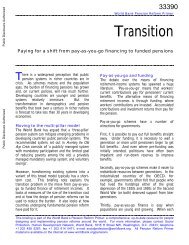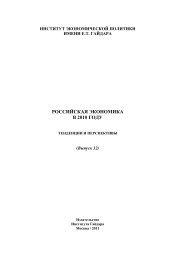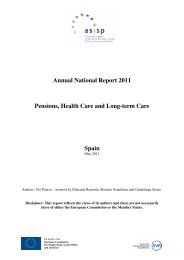Financial Sector Development in Africa: Opportunities ... - World Bank
Financial Sector Development in Africa: Opportunities ... - World Bank
Financial Sector Development in Africa: Opportunities ... - World Bank
Create successful ePaper yourself
Turn your PDF publications into a flip-book with our unique Google optimized e-Paper software.
Hous<strong>in</strong>g F<strong>in</strong>ance 139<br />
changes <strong>in</strong> the macroeconomic outlook. Governments can do more to<br />
develop mortgage lend<strong>in</strong>g by sound economic stewardship of the economy<br />
than any number of fiscal resources or subsidies put <strong>in</strong>to affordable<br />
hous<strong>in</strong>g.<br />
A f<strong>in</strong>al constra<strong>in</strong>t worth highlight<strong>in</strong>g is access to titled land. In his<br />
sem<strong>in</strong>al book The Mystery of Capital, Hernando de Soto set out the vast<br />
potential of unlock<strong>in</strong>g land and property as a source of collateral for the<br />
huge disenfranchised poor population (de Soto 2000). Although the<br />
book may have overstated the potential benefits, improv<strong>in</strong>g property<br />
rights can clearly help to expand secured lend<strong>in</strong>g and the residential<br />
mortgage market. Not only are strong and secure property rights necessary,<br />
but an efficient <strong>in</strong>stitutional framework for record<strong>in</strong>g land rights and<br />
an enforcement mechanism are needed. A framework for register<strong>in</strong>g is<br />
another requirement. Whereas there is often a presumption that <strong>Africa</strong> is<br />
a special case because of the complicated land rights aris<strong>in</strong>g from<br />
postcolonial changes and customary land rights, this need not be an <strong>in</strong>surmountable<br />
obstacle.<br />
It can rightly be argued that the traditional <strong>Africa</strong>n way of life is also<br />
mov<strong>in</strong>g from rural—<strong>in</strong> some cases nomadic—occupations toward urban<br />
liv<strong>in</strong>g. For this transition to happen, land tenure also needs to change.<br />
The traditional land rights and customary rights need moderniz<strong>in</strong>g. As<br />
deSoto describes, this is a process that has occurred <strong>in</strong> almost all countries.<br />
The United K<strong>in</strong>gdom moved from a feudal system; the United<br />
States moved from multiple land ownership systems follow<strong>in</strong>g its Civil<br />
War; other countries all have their own peculiarities and histories. The<br />
key issue, though, is that an equitable transition is needed. This should<br />
<strong>in</strong>volve compensation where appropriate and a clear and transparent<br />
dispute resolution mechanism. Comb<strong>in</strong><strong>in</strong>g strong property rights with an<br />
expansion <strong>in</strong> f<strong>in</strong>ancial access can be a powerful mix for generat<strong>in</strong>g economic<br />
expansion among lower-<strong>in</strong>come groups and unlock<strong>in</strong>g “dead”<br />
capital.<br />
Recommendations<br />
Mak<strong>in</strong>g recommendations applicable to a whole cont<strong>in</strong>ent is a difficult<br />
task, especially given the diversity that exists on the <strong>Africa</strong>n cont<strong>in</strong>ent <strong>in</strong><br />
terms of both economic development and f<strong>in</strong>ancial sector development.<br />
The follow<strong>in</strong>g broad recommendations represent the key development<br />
pillars for grow<strong>in</strong>g hous<strong>in</strong>g f<strong>in</strong>ance systems and tackl<strong>in</strong>g access to hous<strong>in</strong>g<br />
f<strong>in</strong>ance for lower-<strong>in</strong>come groups.







